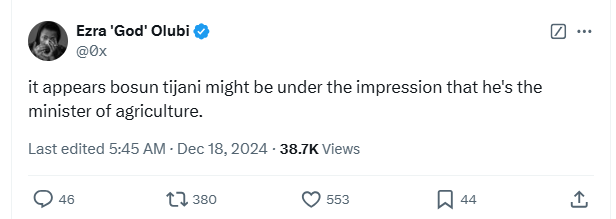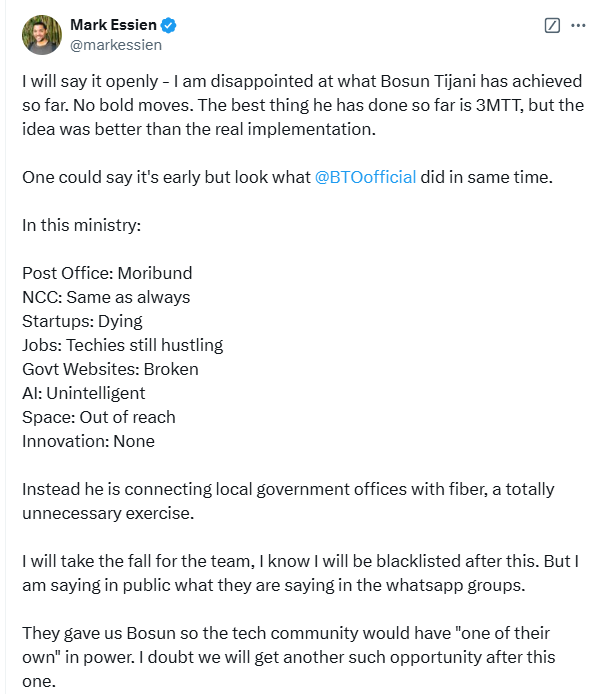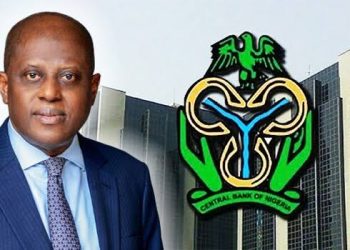When Bosun Tijani was appointed as Nigeria’s Minister of Communications, Innovation, and Digital Economy, many expected him to be the standout star of the new Nigerian government — a catalyst for unprecedented technological growth. However, recent observations suggest that his spotlight may be dimming, with other ministers, such as the Minister of Interior, Dr. Olubunmi Tunji-Ojo stealing the limelight through visible reforms and a more dynamic presence on social media. Tijani’s initiatives, though ambitious, seem overshadowed, prompting critiques from industry leaders like Ezra Olubi, co-founder of payment giants Paystack and Mark Essien, Founder of Hotels.ng and the HNG Internship for software developers, designers, and project managers

A recent viral jab by Ezra Olubi quipped that Bosun Tijani might be under the impression that he is the Minister of Agriculture. While delivered humorously, this statement captures a deeper sentiment within Nigeria’s tech ecosystem: Tijani’s impact is yet to match the high expectations set for his tenure. Bosun’s efforts toward agriculture and food security are far more visible than his work on core technology sectors. This comment has sparked discussion on whether Tijani is encouraging Nigeria’s tech companies to pivot their innovations toward solving food security challenges or if his focus has inadvertently drifted from the digital economy.

Bosun Tijani’s Focus and Initiatives
Since taking charge, Bosun Tijani has rolled out several strategic initiatives aimed at modernizing Nigeria’s digital landscape. Key among these is his emphasis on Artificial Intelligence (AI), positioning Nigeria to participate actively in the global AI race. His focus on AI includes:
1. National AI Strategy: Developing policies to integrate AI across various sectors, from education to healthcare, to drive efficiency and innovation.
2. AI Training Programs: Launching skill development initiatives to train young Nigerians in AI technologies, ensuring the workforce is future-ready.
3. AI Research Grants: Supporting research hubs and universities to accelerate the adoption of AI-driven solutions within the country.
Beyond AI, Tijani’s broader initiatives include:
– Digital Skills Development: Programs aimed at enhancing digital literacy nationwide.
– Broadband Expansion: Efforts to improve connectivity and bridge the digital divide.
– Startup Ecosystem Support: Reducing bureaucratic challenges and facilitating growth for tech startups.
Despite these efforts, many in the tech community feel that Tijani’s initiatives lack the visible urgency and tangible impact needed to transform the sector quickly.
Criticism and Expectations
Bosun Tijani oversees a critical ministry responsible for driving Nigeria’s digital economy forward. The ministry’s mandate covers a range of areas, and criticisms include:
1. Slow Pace of Reform
One of the biggest criticisms Tijani faces is the lack of urgency in implementing reforms. Many anticipated that his appointment would lead to swift, decisive actions to address long-standing challenges in Nigeria’s tech sector. Instead, progress has been perceived as slow and bureaucratic, with tangible results yet to materialize. The expectation was that Tijani’s deep understanding of the ecosystem would allow him to navigate government machinery more efficiently. Unfortunately, the inertia typical of public institutions seems to have affected his ability to execute reforms promptly.
2. Broadband and Connectivity Gaps
Nigeria’s broadband infrastructure remains a significant challenge, with millions still lacking reliable internet access. The expectation was that Tijani would aggressively push for policies and initiatives that would expand broadband coverage and improve connectivity across urban and rural areas. While there have been announcements and plans, implementation has lagged behind, and the impact on internet accessibility has been minimal. This slow progress hampers the growth of digital businesses, education, and innovation.
3. E-commerce and Logistics Bottlenecks
Nigeria’s e-commerce sector has vast potential but continues to be stifled by infrastructural and logistical challenges. Issues with poor delivery networks, inefficient postal services (NIPOST), and regulatory hurdles have not seen the significant improvements expected under Tijani’s leadership. Many hoped that Tijani would introduce policies to streamline logistics, modernize NIPOST, and support the growth of e-commerce platforms. However, the sector still faces delivery delays, high costs, and unreliable service, hindering its ability to scale.
4. Protection Against Government Overreach
The Nigerian tech community has long struggled with government policies perceived as punitive or restrictive. There were high hopes that Tijani, with his industry background, would act as a buffer between tech companies and government overreach. Issues such as sudden regulatory clampdowns, high-handed fines, and ambiguous policies continue to threaten tech startups and established firms. The community expected Tijani to advocate for clear, supportive regulations that would foster innovation, but there has been little visible progress in this area.
5. Attracting Foreign Investment
Given his experience and international connections, Tijani was expected to position Nigeria as a top destination for tech investment. However, foreign investors remain wary due to regulatory uncertainty, infrastructure deficits, and policy inconsistency. More effort is beinv made by private companies and while Tijani has spoken about improving Nigeria’s investment climate, concrete policies or initiatives to attract and retain foreign capital have yet to be fully realized.
6. Visibility and Engagement
Effective leadership in the digital economy requires constant engagement with stakeholders. Many tech leaders feel Tijani has been too reserved and inaccessible, especially when compared to ministers in other departments who maintain active communication channels and provide regular updates on reforms. The Minister of Interior, for instance, has been praised for his consistent social media presence and transparent approach to reforms, making Tijani’s relatively low profile all the more noticeable. The tech community expected more town halls, policy briefings, and public updates to ensure alignment and accountability.
7. Policy Execution Gap
Another criticism centres on the gap between policy announcements and execution. Tijani has rolled out several ambitious plans, such as AI initiatives and digital skills programs, but the translation of these plans into actionable, on-the-ground change has been limited. The tech community wants to see measurable outcomes, such as increased internet penetration rates, streamlined logistics systems, and reduced bureaucracy for startups.
8. Policy Framework for Emerging Technologies
The absence of a comprehensive policy framework for emerging technologies such as blockchain, fintech, and cybersecurity is a significant gap in Nigeria’s digital economy strategy. These technologies have the potential to revolutionize sectors such as finance, healthcare, education, and logistics, but uncertainty around regulations creates hesitation among investors, innovators, and users.
In the blockchain and fintech space, clear regulations are needed to guide the operations of cryptocurrency exchanges, digital payment platforms, and decentralized finance (DeFi) solutions. The lack of clarity often leads to crackdowns and bans, which stifle innovation and drive talent and investment to more accommodating markets. A notable example is Tijani’s lack of visible intervention during the controversy surrounding Binance’s employees detained in Nigeria. His ministry’s absence during this incident highlighted the need for a defined policy stance to protect tech workers and provide clear guidelines for blockchain and crypto-related businesses.
9. Private Sector Collaboration
One of the key expectations for Bosun Tijani is to foster stronger collaboration between the government and the private sector. While there have been some efforts to engage with tech startups and industry leaders, these interactions have not been consistent or comprehensive enough to shape effective policies and initiatives. The private sector, including startups, large tech firms, and investment bodies, possesses invaluable insights into the real challenges and opportunities within Nigeria’s tech ecosystem.
The tech community expects more regular forums, advisory councils, and collaborative projects that bring together government officials, entrepreneurs, investors, and tech associations. Through consistent engagement, Tijani can ensure that government policies are practical, business-friendly, and conducive to innovation. Initiatives like public-private partnerships (PPPs), industry roundtables, and open feedback sessions would help bridge the gap between policy intent and implementation.
10. Digital Inclusion
Despite Nigeria’s growing tech industry, millions of citizens remain digitally excluded, especially in rural areas, underserved communities, and among women and youth. Limited access to the internet, lack of affordable devices, and low levels of digital literacy create significant barriers to participation in the digital economy. Without addressing these challenges, Nigeria risks widening the gap between tech-savvy urban areas and digitally marginalized regions.
Bosun Tijani is expected to implement comprehensive digital inclusion strategies that ensure equitable access to technology across the country. These strategies should focus on:
11. Addressing Multiple Portfolios
The Ministry of Communications, Innovation, and Digital Economy is a multi-faceted portfolio with overlapping responsibilities. Tijani is expected to juggle the demands of communications infrastructure, innovation policy, startup support, and postal reforms. Critics argue that he has not shown enough prioritization or focus, spreading efforts too thinly without achieving significant breakthroughs in any one area.
The expectation was that Tijani, given his deep involvement in the tech ecosystem through CcHub, would swiftly address these challenges. Instead, critics argue that progress has been slow and disjointed, with more visible results being seen from other ministries.

Tech Voices of Criticism: Ezra Olubi and Mark Essien
The dissatisfaction within the tech community is not new. Ezra Olubi’s recent remark reflects growing impatience with the perceived lack of urgency in Tijani’s ministry. Similarly, Mark Essien, Founder of Hotels.ng, has pointed out the need for clearer, more decisive action to unleash Nigeria’s tech potential.

These critiques specifically highlight a few key concerns reiterating what we have noted;
-Pace of Reform: Stakeholders expected immediate, impactful reforms that would address long-standing challenges in connectivity, investment, regulation, and innovation support. The slow implementation of necessary changes has created frustration within the tech community, which operates at a much faster pace than traditional bureaucratic processes.
-Visibility: Effective reforms need to be communicated clearly and consistently. A stronger social media presence, public engagement, and regular updates on initiatives could bolster confidence in Tijani’s efforts. Additionally, celebrating successes such as new tech unicorns and facilitating their engagement with the federal government and Senate would help bridge the gap between the government and the tech ecosystem.
-Policy Execution: The gap between policy announcements and actual implementation remains a significant issue. Concrete results are needed to validate Tijani’s vision and demonstrate progress. Announced policies must be followed by tangible, measurable outcomes that benefit the tech industry and its stakeholders.
-Understanding Innovation and Tech Pace: There is a need for Tijani to help the government and the establishment better understand the fast-paced nature of tech innovation. This includes educating policymakers on how traditional bureaucratic delays can hinder growth and working to streamline processes to match the rapid evolution of the tech industry.
-Protecting Tech Workers: Tijani must play a more active role in protecting tech workers from issues such as police clampdowns, harassment, and economic and financial crime witch hunts. Instances like the detention of Binance employees illustrate the urgent need for clear policies and protections to ensure that tech professionals can work without fear of unwarranted persecution.
Should Bosun Tijani Be Replaced?

While frustration with Bosun Tijani’s performance is understandable, calls for his replacement may be premature given his potential to drive meaningful change. His extensive background, industry experience, and understanding of Nigeria’s tech ecosystem remain valuable assets. Instead of replacing him, the focus should be on maximizing his strengths and addressing key shortcomings. To restore confidence and deliver the impact expected, Tijani should consider the following seven key actions:
1. Reprioritizing Key Initiatives:
Focus on the immediate challenges facing the tech sector, such as broadband expansion, improving e-commerce logistics, and reforming the postal service (NIPOST) while still keeping sigh of AI, Space, Green tech and other global opportunities. These foundational improvements are essential to unlock growth in digital services, startups, and small businesses.
2. Enhancing Transparency and Engagement:
Develop a structured framework for regular communication with the tech community and the public. This includes frequent policy updates, town halls, more media interviews and clear timelines for initiatives. Transparency will foster trust and ensure alignment with the ministry’s goals.
3. Strengthening Collaboration with Industry Leaders:
Actively collaborate with industry stakeholders, including startups, tech hubs, investors, and corporations, to ensure that policies are practical and address real-world challenges. Regular engagement will help fine-tune initiatives, making them more effective and relevant to the ecosystem.
4. Increasing Visibility and Celebrating Successes:
When major milestones, such as new tech unicorns or significant innovations, are achieved, Tijani should play a visible role in celebrating and promoting these successes. Facilitating their engagement with the federal government, Senate, and regulatory bodies will demonstrate his commitment to supporting growth and ensuring protection for tech companies.
5. Delivering Quick Wins:
Prioritize achievable, short-term successes that can deliver immediate and visible benefits. Initiatives like improving connectivity in targeted regions, simplifying business registration processes, or enhancing cybersecurity frameworks can build momentum and restore confidence in his leadership.
6. Advocating for Protection Against Government Overreach:
Act as a buffer between tech companies and potential government overreach by advocating for fair, clear, and supportive regulations. Protecting startups and established firms from punitive measures, high-handed fines, or ambiguous policies is crucial to maintaining a vibrant and innovative ecosystem.
7. Fostering Digital Inclusion:
Implement comprehensive strategies to bridge the digital divide by expanding affordable broadband access, promoting digital literacy, and developing infrastructure in rural and underserved areas. This ensures that all Nigerians, especially women, youth, and marginalized groups, can participate in and benefit from the digital economy.
By adopting these seven strategies, Bosun Tijani can reposition himself as a catalyst for positive change and fulfil the high expectations of Nigeria’s tech community. Success lies in his ability to balance vision with execution and create a supportive environment that drives innovation, inclusion, and sustainable growth.
A Path Forward
Bosun Tijani’s journey as the Minister of Communications, Innovation, and Digital Economy is far from over. His confirmation by the Nigerian Senate was notoriously difficult, marked by gruelling scrutiny and questions over his past statements and positions. This challenging start may have forced him into a position of political caution, influencing his ability to drive bold reforms. The pressure to curry favour with the establishment—a government he was previously perceived to oppose—might be diluting his impact and stalling the decisive action expected from him.
This raises an important question: Can Tijani navigate the political tightrope, maintain his position, and still deliver for the tech community? Striking this balance requires a nuanced approach—one where he can retain the support of government stakeholders while remaining a champion for innovation and digital growth. His success depends on his ability to stay true to the mission of advancing Nigeria’s digital economy without compromising on the needs and values of the tech ecosystem he once helped to build.
To achieve this, Tijani needs to prioritize immediate, high-impact initiatives that align with both government objectives and the demands of the tech community. By embracing transparency, consistent communication, and public engagement, he can demonstrate that his policies are both pragmatic and visionary.
Additionally, he must creatively address the perception that his political alignment is clouding his judgment. Rather than compromising to appease the establishment, Tijani should focus on educating policymakers about the pace of innovation and the need to protect tech workers and companies from undue clampdowns. Showing that he can advocate for the tech industry while maintaining his ministerial role will earn him the respect of both the government and the ecosystem.
Ultimately, the tech community remains watchful and hopeful that the potential seen in Tijani will manifest in tangible results as we hope he reclaims his position as a driving force for Nigeria’s digital future.
.














